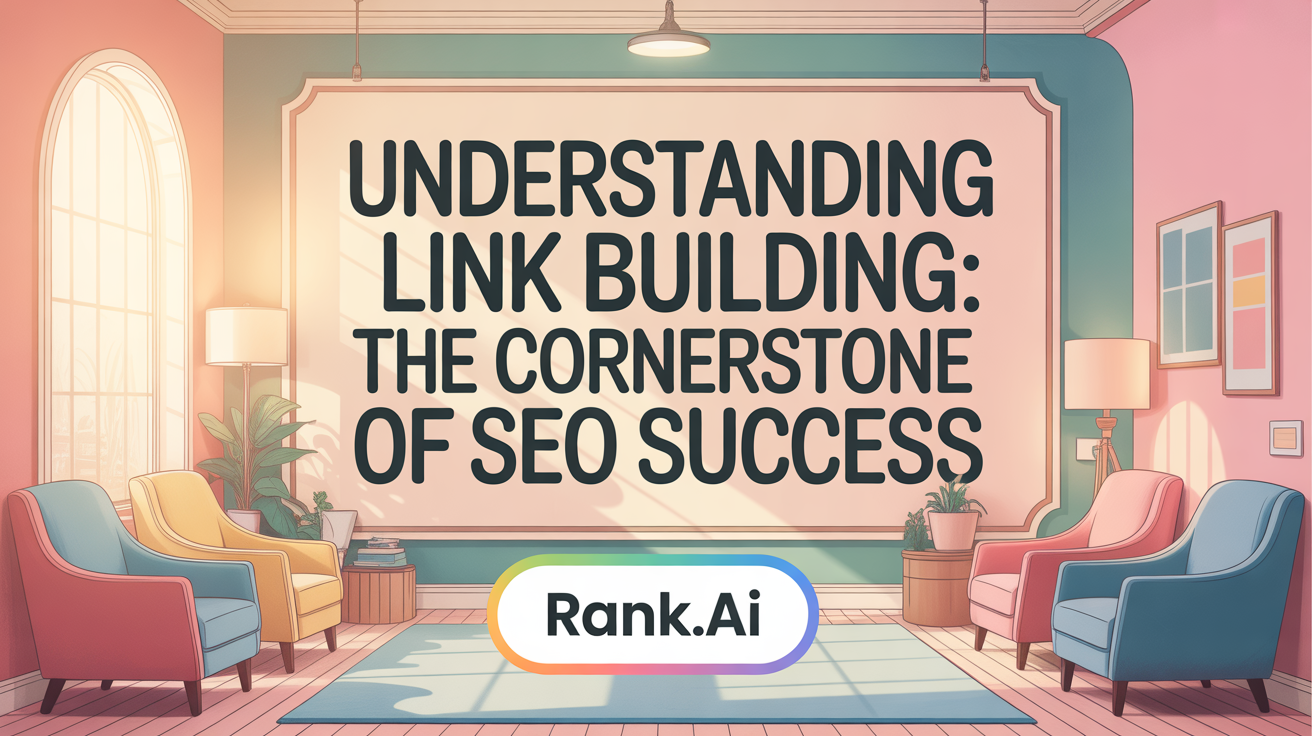Embracing a New SEO Paradigm
As SEO strategies evolve with the digital landscape, authority building emerges as the definitive approach, surpassing traditional link building. This article explores why authority building is the new cornerstone of effective SEO, examining its connection to link building, its relevance in 2025, and how businesses can harness it to improve search rankings, trust, and brand reputation.
The Fundamental Purpose of Link Building in SEO

What is the purpose of link building in SEO?
Link building plays a central role in search engine optimization by increasing both the number and quality of inbound links, or backlinks, to a website. These links serve as endorsements from other online sources, signaling to search engines that the content on your site is trustworthy and valuable.
The main goal is to enhance your site’s authority and relevance, which directly influences your search engine rankings. High-quality backlinks from reputable and relevant sites weigh more heavily in ranking algorithms, establishing your website as an authority within its niche.
Different types of backlinks, such as editorial links from news outlets, resource links from curated lists, guest post links, and social media shares, create a natural and diverse backlink profile. This diversity helps search engines assess your site’s credibility more accurately.
Effective link building involves acquiring these links ethically through white hat strategies like creating valuable content, engaging with industry-specific communities, and conducting outreach. Avoiding manipulative tactics like buying links or participating in link schemes is crucial, as such practices can lead to penalties.
In summary, the purpose of link building in SEO is to support a website’s long-term growth by boosting its authority, relevance, and visibility in search engine results, ultimately driving more organic traffic and increasing credibility among users and search engines alike.
Link Building's Enduring Relevance in 2025 SEO Strategies
Is link building still relevant for SEO in 2025?
In 2025, link building remains a cornerstone of effective SEO strategies. Extensive industry research and data reinforce its importance, with studies showing a strong correlation between the quality and quantity of inbound links and search engine rankings. For instance, a recent analysis of one million keywords revealed that websites with more high-quality backlinks tend to have significantly better rankings.
High-authority, relevant backlinks continue to serve as votes of confidence to search engines like Google. These links help establish trustworthiness and authority, factors that are increasingly prioritized in ranking algorithms. Despite the rise of AI-driven content and other innovative tactics, the fundamental value of backlinks remains unchanged.
Many businesses maintain dedicated budgets—often between $1,000 and $5,000 monthly—to acquire and nurture quality links through methods such as digital PR, guest blogging, and broken link building. This ongoing investment underscores the perceived importance of backlinks for organic visibility.
Link building correlations with rankings
Data from industry surveys consistently show that successful pages typically possess 3.8 times more backlinks than lower-ranked counterparts. Moreover, a site’s domain authority, relevance, and the contextual placement of links are critical metrics used by search engines to evaluate backlink profiles. It’s not just about collecting links but acquiring those from reputable, high-DR sites with genuine engagement.
Google’s algorithms have shifted to favor relevance and expertise, especially in sectors like health, finance, and legal industries. Consequently, backlinks from industry-specific authoritative sources, embedded naturally within relevant content, carry more weight than numerous low-quality links.
Investment in link acquisition
The significance of quality links translates into a dedicated focus on strategic link building efforts. Agencies and SEO teams often prioritize outreach to reputable sites, leveraging influencers, digital PR campaigns, and creating linkable assets like research reports, infographics, and industry statistics. Ethical and white-hat tactics are emphasized to maintain a natural link profile and avoid penalties.
The growing costs for acquiring high-quality links reflect their value; many allocate thousands of dollars monthly to ensure sustainable link growth and brand authority. This investment supports long-term ranking stability and helps build topical relevance within a niche.
Integration with internal linking and topical clusters
Effective SEO in 2025 integrates external link strategies with strong internal linking and content structuring. Creating topical clusters—groups of related content that demonstrate expertise—helps establish site authority and improves topical relevance.
Internal links connect these clusters, guiding both users and search engines through a logical hierarchy of content. This enhances user experience and distributes authority throughout the site, reinforcing the overall topical authority.
Overall, link building continues to serve as an essential component in SEO, shaping rankings through quality, relevance, and strategic integration with a site’s content ecosystem.
Authority Building vs. Traditional Link Building: Key Differences
How does authority building differ from traditional link building strategies?
Authority building and traditional link building have distinct approaches to enhancing a website’s SEO presence. Traditional link building focuses mainly on acquiring backlinks through outreach, guest posting, and other tactics that increase the number of links pointing to a site. The primary goal is often to boost rankings quickly by increasing backlink quantity and quality from relevant sources.
In contrast, authority building emphasizes the overall credibility, trustworthiness, and reputation of the website or brand. Instead of just collecting links, it aims to foster organic growth in domain authority through the creation of high-quality, evergreen content that remains valuable over time. This includes engaging in digital PR campaigns, managing brand mentions across the web, and conducting backlink audits to ensure the integrity and relevance of backlinks.
A key aspect of authority building is the production of shareable assets—such as in-depth guides, original research, and data-driven content—that naturally attract backlinks from reputable sources. Digital PR plays an essential role by securing placements in high-authority publications, which further bolster the site’s industry standing.
Relevance is crucial in both strategies; however, authority building prioritizes relevance through genuine relationships and content that aligns with target audience interests and industry standards. This sustainable approach aims for long-term growth in authority and influence, rather than quick wins.
While traditional link building can deliver faster results, it may involve manipulative tactics that risk penalties if misused. Conversely, authority building fosters a natural, resilient SEO foundation by increasing a site’s overall trust and credibility, making it better equipped to withstand algorithm updates.
Why Authority Building is the Evolution of Link Building
Why is authority building considered the new form of link building?
Authority building has become the modern approach to SEO that redefines traditional link strategies. Unlike earlier practices that primarily focused on acquiring numerous backlinks, today’s SEO emphasizes establishing a website's credibility, trustworthiness, and expertise.
Search engines like Google now prioritize sites that demonstrate genuine authority through high-quality content, strong brand presence, and authoritative mentions. This means creating valuable, informative resources—such as in-depth articles, white papers, and original research—that naturally attract backlinks from respected sites. These high-quality links serve as strong signals of trust, boosting search rankings.
Furthermore, building relationships within your industry is crucial. Collaborating with influencers, journalists, and industry publications enhances your site’s perceived authority and visibility. Engaging in digital PR, participating in niche discussions, and earning mentions in reputable outlets all contribute to a holistic authority profile.
This approach aligns with the evolving search engine algorithms, which now give more weight to relevance, trust, and reputation. As a result, authority building isn't just about link quantity but about creating a trustworthy ecosystem that naturally draws high-value backlinks and elevates your site’s rankings.
In essence, authority building fosters a sustainable SEO strategy that emphasizes credibility over manipulative tactics, ensuring long-term success in search engine results.
Effective Tactics and Best Practices for Building Authority in SEO

What are effective tactics and best practices for building authority in SEO?
Building authority in SEO involves a combination of content quality, technical optimization, strategic backlink acquisition, and ongoing performance management. Creating high-quality, relevant, and comprehensive content is foundational. These assets should address specific user questions, provide unique insights, or feature original research, making them link-worthy and shareable.
On-site SEO plays a crucial role. Optimizing URLs, crafting compelling titles, tailoring meta descriptions, and using descriptive alt text for images enhance how search engines interpret your pages. This technical finesse improves visibility and user experience, encouraging longer site visits and organic sharing.
Developing a robust backlink profile is essential. Focus on earning links naturally through outreach efforts, digital PR, and creating linkable assets such as infographics and videos. These formats attract shares and backlinks from reputable sources, signaling credibility.
Incorporating multimedia enhances content appeal. Visuals like infographics, videos, and interactive elements not only improve engagement but also increase the chances of earning backlinks, as they are more attractive to content creators.
Monitoring performance regularly is vital. Using tools like Google Search Console and Ahrefs helps track backlinks, identify opportunities for further link-building, and monitor keyword rankings. This ongoing assessment ensures strategies remain aligned with SEO best practices.
Adhering to ethical SEO principles, focusing on white-hat tactics, and maintaining a technically sound website—such as fast load times and efficient internal linking—are fundamental. These practices ensure long-term growth and safeguard against penalties.
By integrating these tactics—creating exceptional content, optimizing on-site elements, building a quality backlink profile, leveraging multimedia, and consistently monitoring results—websites can steadily enhance their authority, improve search rankings, and drive sustainable organic growth.
The Critical Role of Relevance in Modern Link Building Strategies
What role does relevance play compared to authority in link building strategies?
Relevance is at the forefront of effective link building today, especially under Google's evolving algorithms. While gaining high-authority links—such as those from reputable industry sites—has long been prized, relevance adds a layer of specificity that can significantly boost SEO outcomes. Search engines prioritize links from sites that are topically related, as these provide clearer signals of trustworthiness and contextual appropriateness.
Instead of focusing solely on metrics like Domain Rating (DR) or Domain Authority (DA), modern strategies emphasize obtaining backlinks from relevant sources within your niche. Such links not only enhance search rankings but also drive targeted traffic, increase user engagement, and build industry-specific authority.
Expert opinions highlight that irrelevant links, even from high-authority sites, are increasingly discounted by Google. This shift underscores the importance of creating content that aligns with your audience’s interests and reaching out to similar niche sites. Such relevance-driven backlinking reinforces your site's topical expertise, helping to improve rankings for keywords your audience cares about.
Ultimately, blending relevance with authority in your link profile—by targeting sites with both high relevance and sufficient domain strength—delivers the most impactful results. This approach ensures that search engines see your content as trustworthy and pertinent, leading to sustained SEO growth.
How Authority Building Enhances Search Rankings and Trust Signals
How does authority building impact search ranking and trust signals?
Building authority is a fundamental aspect of effective SEO in 2025. It directly influences search engine rankings and the signals that convey trustworthiness to users and algorithms alike. When a website demonstrates expertise, relevance, and reliability, search engines like Google are more likely to prioritize its content in search results.
A strong authority foundation is established through various strategies. Developing topical authority, for example, involves producing comprehensive, well-structured content around specific subject areas, which helps search engines understand the site's mastery in those topics. This is further reinforced by a strategic internal linking structure that signals content relevance and site depth.
Trust signals also include high-quality backlinks from reputable sources, credible author credentials, recent content updates, and transparent site policies. These elements collectively enhance the website’s perceived credibility. High-quality backlinks act as votes of confidence, indicating to Google that the site is trusted and authoritative.
Additionally, sites with recognized authority are more likely to earn rich results and featured snippets, which further elevate their visibility on search engine results pages (SERPs). These rich snippets not only improve click-through rates but also serve as trust indicators for users.
In conclusion, authority building is integral to improving search rankings and establishing trust signals. It fosters user confidence and positions a website as a reliable, expert resource—core components for long-term SEO success.
Ethical and Effective Authority Enhancement Methods in SEO
Building authority in SEO is essential for achieving higher search rankings and maintaining a trustworthy online presence. The most responsible and effective approach focuses on creating valuable, original content that genuinely benefits users. This includes developing comprehensive guides, expert insights, infographics, and engaging multimedia assets that address real audience needs.
Natural relationship-based link building plays a vital role. Strategies such as guest posting on reputable industry sites, collaborating with influencers, and promoting content through social media channels facilitate earning backlinks organically. These methods adhere to search engine guidelines and promote sustainable growth, as they are rooted in mutual value and trust.
Maintaining transparency and prioritizing user experience are equally important. Respecting intellectual property rights, ensuring website accessibility, and providing clear, honest information foster trust among visitors and industry peers alike. Creating a positive and ethical online reputation encourages reputable sites to link to your content voluntarily.
Regular monitoring of backlink profiles and site performance using ethical analytics tools helps detect potential risks and opportunities. This ongoing evaluation ensures that SEO efforts remain aligned with guidelines, ultimately safeguarding against penalties and enhancing long-term authority.
By focusing on moral values and a user-centric approach, SEO practitioners can build credible authority over time. This sustainable strategy not only improves rankings but also strengthens brand reputation, leading to increased trust, engagement, and growth in the digital space.
Authority Building’s Influence on Brand, Content, and Website Reputation
How does authority building influence brand, content, and website reputation?
Establishing authority is crucial for shaping a positive perception of your brand, the quality of your content, and the overall reputation of your website. When a site consistently produces high-quality, relevant content and earns backlinks from reputable, industry-specific sources, it signals trustworthiness to search engines and users alike.
This process positions the website—and by extension, the brand—as an industry leader. As authority grows, search rankings improve, leading to increased visibility and organic traffic. Users tend to trust sources that demonstrate expertise, which encourages long-term engagement and loyalty.
Beyond search rankings, authority building fosters social proof—reviews, testimonials, media mentions, and endorsements—that further strengthens reputation. These elements serve as third-party validation, influencing potential customers and partners.
In competitive markets, having a recognized authority sets a brand apart. It helps differentiate through credibility, making consumers more comfortable choosing your products or services over less authoritative competitors. Ultimately, cultivating authority supports sustained growth, enhances brand perception, and cements your standing as a trusted industry figure.
Industry Trends Shaping Authority-Focused SEO Practices

What are the current industry trends and future prospects of authority-focused SEO practices?
In 2025, SEO strategies are emphasizing authority through a combination of content quality, topical relevance, and trust signals. Search engines like Google now prioritize websites that demonstrate expertise, authoritativeness, and trustworthiness—collectively known as E-A-T—especially in sectors like finance, health, and legal services.
One prominent trend is the focus on establishing topical and brand authority. Creating in-depth content, engaging subject matter experts, and building backlinks from highly relevant, high-authority sources reinforce a site’s credibility. Content strategies are increasingly aligned with user intent, supported by structured data and robust technical SEO, to enhance visibility and relevance.
Simultaneously, AI integration is transforming content development and personalization. AI-powered tools assist in keyword research, content creation, and predictive analytics that forecast trending topics and formats likely to attract backlinks. This allows marketers to stay ahead of trends by tailoring their content to emerging needs and interests.
The rise of zero-click searches, voice, and visual searches has expanded the scope of SEO efforts. Content optimized for voice assistants and visual platforms like TikTok, Instagram, and Xiaohongshu must be concise, engaging, and shareable. Video content, infographics, and interactive assets also serve as linkable, shareable materials that boost authority.
Multi-channel optimization is essential, as backlinks and engagement now come from diverse platforms. Leveraging social commerce, influencer collaborations, and digital PR enhances reach and generates inbound links naturally. Collaborations with nano and micro-influencers (followers of 10,000–50,000) offer targeted engagement and credible backlink opportunities.
Looking ahead, integrating AI tools for automation, content personalization, and data analysis will be standard practice. Building genuine expertise and backlinks from relevant, high-quality sites will remain crucial, as algorithms increasingly scrutinize link relevance and quality.
In summary, authority-focused SEO is evolving from traditional backlink collection towards a holistic approach that combines content excellence, technical robustness, and strategic relationship-building across digital channels. The future lies in adaptable, user-centric, and trustworthy content strategies that foster long-term credibility and visibility.
AI and Technology: Enhancing Authority Building and Link Acquisition
How are AI-powered outreach tools improving link building efforts?
AI tools like Ahrefs and BuzzStream streamline the process of outreach and prospect identification. These platforms help marketers find relevant websites more efficiently, automate contact management, and personalize outreach messages. This automation saves time and increases the chances of securing valuable backlinks from high-authority sources.
How does predictive analytics aid in forecasting trending topics?
Predictive analytics analyze data trends to forecast which topics and content formats are likely to attract backlinks. By identifying emerging trends early, marketers can create targeted content that resonates with audiences and industry influencers, giving them a competitive edge in link acquisition.
Why consider working with an AI SEO agency?
While AI tools enhance the efficiency and effectiveness of SEO strategies, they cannot replace human expertise. An AI SEO agency combines the power of technology with industry knowledge, providing a tailored approach to link building, ensuring relevance and quality in backlink profiles.
How does automation maintain a balance with human oversight?
Automation accelerates routine tasks such as prospecting and outreach, but a human touch remains essential for relationship-building, authenticity, and strategic decision-making. Combining AI-driven automation with expert oversight results in more sustainable and credible link-building efforts.
Leveraging Influencers and Social Commerce for Authority Growth
Collaborations with nano and micro-influencers
Partnering with nano (fewer than 10,000 followers) and micro-influencers (10,000-50,000 followers) offers targeted opportunities for backlinks and credibility. These smaller influencers often have highly engaged audiences within specific niches, making collaborations more authentic and effective. By working with them to create sponsored content or product reviews, brands can earn valuable backlinks from relevant sites and social profiles.
Social platforms driving backlinks
Social platforms like Douyin, Xiaohongshu, Instagram, and TikTok are not only channels for engaging audiences but also powerful drivers of backlinks. Sharing compelling, shareable content that resonates with users encourages organic sharing and engagement, which can lead to backlinks from blogs, news sites, and other digital platforms. These platforms amplify your content's reach, helping to build authority and grow your SEO presence.
Creating shareable content for engagement
High-quality, engaging content—such as infographics, videos, and in-depth blog posts—tends to be more shareable. Creating content that provides value, solves specific problems, or offers unique insights encourages users to share across social media channels. This organic sharing increases brand visibility and can generate natural backlinks as other websites reference your content.
Brand visibility through social commerce
Integrating social commerce features on platforms like TikTok and Instagram directly impacts backlinks and brand authority. When users purchase or engage with products directly via social media, it enhances brand trust and recognition. Additionally, shoppable posts and influencer campaigns often prompt media outlets and blogs to link back to your site, further boosting your SEO efforts.
By combining these approaches, businesses can harness the power of social platforms and influencer collaborations to enhance their backlink profile and establish greater authority in their industry.
Advanced Link Acquisition Strategies Supporting Authority Building

How can digital PR and newsworthy content creation enhance link building efforts?
Digital PR remains a vital approach in 2025 for earning high-quality backlinks. By producing newsworthy, data-driven content such as reports, studies, or unique insights, businesses can attract media attention and industry recognition. Pitching this compelling content to journalists, bloggers, and influencers results in coverage from reputable websites, significantly boosting authority and visibility.
Effective digital PR involves creating content that resonates with current trends or public interests, making it more shareable and linkable. Outreaching through personalized emails and maintaining genuine relationships with journalists helps secure placements that are both valuable and relevant.
What roles do broken link building and skyscraper techniques play?
Broken link building is a strategic method where SEOs identify dead links on authoritative sites. They then suggest their relevant, high-quality content as a replacement, providing value to website owners while earning backlinks. This technique benefits both parties—sites eliminate outdated links, and your site gains high-authority links.
The skyscraper technique involves finding successful content within your niche, creating a more comprehensive and valuable version, and then promoting it to garner backlinks. By exceeding existing content in quality and depth, you position yourself as a top resource, encouraging other websites to link to your content naturally.
How does guest posting on reputable sites support link and authority building?
Guest posting remains a cornerstone in 2025 link strategies. Focused on publishing insightful articles on high-authority, industry-relevant websites, guest blogging allows for natural inclusion of backlinks. This boosts your site's credibility and drives targeted traffic.
Successful guest posts are tailored to the host site’s audience and crafted to demonstrate expertise. Embedding contextual links within the content, rather than in overly promotional or keyword-stuffed ways, ensures better rankings and reputation.
What is competitor backlink hijacking, and how can it influence content marketing?
Backlink hijacking involves analyzing your competitors' backlink profiles using tools like Ahrefs or Semrush. Identifying high-quality backlinks they have earned, then replicating or obtaining similar links from authoritative sites, can elevate your own rankings.
This process supports your content marketing efforts by understanding what types of content attract backlinks and which sites are linking to competitors. Developing similar or superior content, coupled with targeted outreach, helps you build a robust backlink profile that reinforces your site’s authority.
By combining these advanced tactics—digital PR, broken link building, skyscraper strategies, guest posting, and competitor hijacking—you can establish a strong, credible online presence. Prioritizing relevance and quality remains essential as search engines continue to reward genuine, authoritative links over manipulative practices.
Ensuring a Natural and Relevant Backlink Profile for Sustainable SEO

Why is quality more important than quantity when building backlinks?
In 2025, the focus in SEO is increasingly on acquiring high-quality backlinks rather than amassing numerous links. Search engines like Google prioritize relevance and authority, meaning links from reputable, niche-relevant sites carry more weight. A few high-quality links from trusted sources can significantly boost your website’s credibility and rankings, whereas many low-quality links from spammy or irrelevant sites can harm your SEO efforts.
How can you avoid penalties associated with link schemes?
Engaging in manipulative tactics such as buying links, participating in private blog networks (PBNs), or reciprocal linking can result in penalization by Google. It’s crucial to earn backlinks naturally by creating valuable, shareable content and building genuine relationships with industry influencers. Focus on digital PR, guest posting, and creating linkable assets that attract links in an authentic manner.
How should backlinks be evaluated?
When assessing backlinks, consider metrics like Domain Authority (DA), relevance to your niche, traffic, and site stability. High-DA sites (50+) with steady organic traffic and low spam scores offer more SEO value. Relevance is vital; links from industry-specific sites strengthen your topical authority and trustworthiness, making your backlink profile more effective.
Why is maintaining a balanced profile of follow and nofollow links important?
A natural backlink profile includes both follow and nofollow links. Follow links pass link equity, helping to boost your rankings, while nofollow links still generate traffic and diversify your link profile. Over-reliance on follow links can seem manipulative, so balancing both types ensures a healthy, credible portfolio that aligns with white hat SEO principles.
Building a natural, relevant, and balanced backlink profile is essential for sustainable SEO success. It involves prioritizing high-quality links, avoiding black hat tactics, and continuously evaluating your link profile to maintain trustworthiness and authority.
Authority Building: The Future of Link Strategies
The SEO landscape in 2025 underscores a decisive shift from traditional link building toward authority building, a strategy rooted in credibility, expertise, and relevance. This holistic approach not only aligns with Google’s evolving algorithms prioritizing trust and topical authority but also fosters sustainable brand reputation and meaningful user engagement. By embracing ethical content creation, relationship-driven link acquisition, and leveraging emerging technologies like AI, businesses can build lasting authority that translates into higher search rankings and enduring digital presence. Ultimately, authority building is not just the new form of link building — it is the future cornerstone of SEO success.
References
- New Link Building Strategies | Link Building in 2025
- New Link Building Strategies for 2025: Earning Quality Backlinks ...
- Secrets of High-Authority Link Building in 2025 - Rank Wizards
- The Significance of Topical Authority - LBHQ - Link Building HQ
- 8 Types Of Link Building In SEO To Improve Authority - Konker
- Is Link Building Still Important for SEO in 2025? - Wisp CMS
- Link Building For Startups - How To Build A Brand & Authority
- Relevance, Trust, or Authority: Which Is More Important in a Link ...
- What Is Link Building and Why Does It Matter in 2025? - SEOSpace



